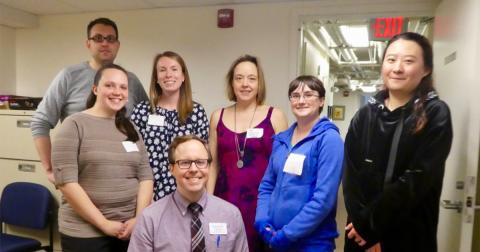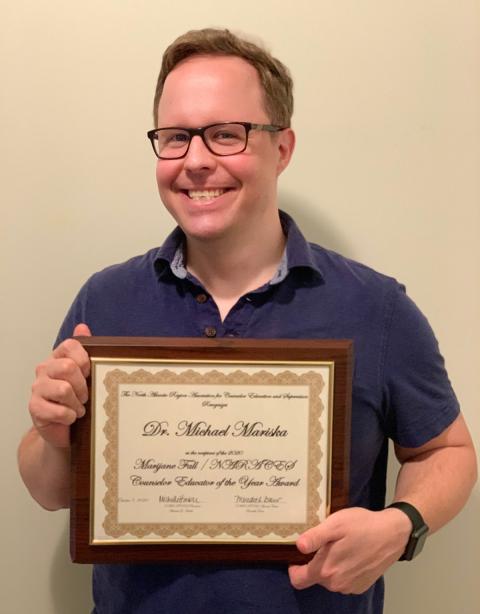
The counseling profession can be stressful and difficult at times, but its many rewards include exceptional collegiality. Professor Mike Mariska models this benefit for students in everyday interactions.
“One of the main things I try to express in my classes is sincere and interested gratitude for all of the contributions students make,” he says. “I think it takes courage to speak up in a class, especially when you’re concerned about judgment from your peers and your professor.”
Mariska is sensitive to the hurdles posed by online courses, noting, “It can be even harder to speak up on Zoom because you become the complete center of attention.” He has responded by employing the application’s chat function that promotes off-camera interactions.
Mariska joined Plymouth State’s counselor education and school psychology department in 2014 and currently serves as program and academic unit director. His many responsibilities also include coordinating the clinical mental health counseling program.
His PSU activities are informed by years of professional service, recently recognized by the North Atlantic Region Association for Counseling Education and Supervision’s (NARACES) Marijane Fall Counselor Educator of the Year Award. The award is especially meaningful as Mariska formerly headed the NARACES committee that created it.
“Mike has made significant contributions in the field of clinical mental health counseling,” noted colleague Gary Goodnough in his award nomination. “As a professor at Plymouth State University, he has been a gifted teacher who has taught many classes using humor and a caring demeanor to help students learn. Mike has a well-deserved reputation as someone who creates a safe classroom atmosphere that allows students to take risks and grow.”
Marijane Fall was a prolific researcher, author, and national expert in play therapy. “She really exemplified some of the traits we hoped to see in our colleagues and the type of counseling we aspire to,” Mariska says. “It is an honor and I’m excited to have received this award.”
Mariska served for many years on NARACES’s executive board and as president in 2017–2018. He helped advance multiple initiatives including the Emerging Leaders program, and worked closely with the Journal of Counseling and Preparation.PSU is the beneficiary of Mariska’s substantial field involvement. He is currently leading the University’s national reaccreditation process through the Council for Accreditation of Counseling and Related Educational Programs (CACREP). PSU’s master’s level counseling program is the only one in New Hampshire that is CACREP-accredited, and the master’s-level clinical mental health program is one of only three. “CACREP is a standard of quality that’s difficult to get and obtain,” says Mariska. “It plays a huge role in licensure and gives our graduates confidence professionally.”

Mariska’s classes participate in two signature PSU initiatives: the Standardized Patient Program and mock disaster drills. Both of these unique resources provide counseling students with indispensable experience through collaboration with peers from other disciplines.
The Standardized Patient Program features PSU theatre students acting out psychological issues for budding counselors to unpack, providing a more realistic scenario than the standard strategy of having students practice with each other. The University’s nursing discipline has been key to the program’s development and success, and Mariska is also quick to acknowledge the work of Graduate Teaching Lecturer Ryan Acquilina ’04, ’15G. The two are contemplating a journal article to share their findings.
By role-playing intense occurrences such as the aftermath of a clinic bombing, the disaster drills allow students to practice their ‘psychological first aid.’ “It’s a chance for students to prepare to respond to emergency situations and a stepping stone between classroom and practice that’s pretty unique to PSU,” Mariska says.
“Within the first minute of the drill, everyone’s demeanor shifts to serious, professional, and caring, so much so that the drill feels realistic,” says Alison Cole ’20. Jennifer Mardin ’20 adds, “It gave me confidence that if something truly horrible does happen, I’ll be able to keep my head and help others. It made me feel prepared and determined to keep training.”
The actions of my colleagues and my students—their caring and empathy—are what make my work easier and more enjoyableProfessor Mike Mariska
In addition to his many PSU duties, Mariska is a licensed clinical mental health counselor who works as a clinician one day per week. Whether assisting clients and students, engaged in administrative tasks, or arranging mock disasters, he feels fortunate to be in such a supportive line of work.
“The actions of my colleagues and my students—their caring and empathy—are what make my work easier and more enjoyable,” he says. “I truly believe that our profession attracts wonderful people, including students who want to help others and are entering a selfless career, and it makes the job so much more fulfilling.”

